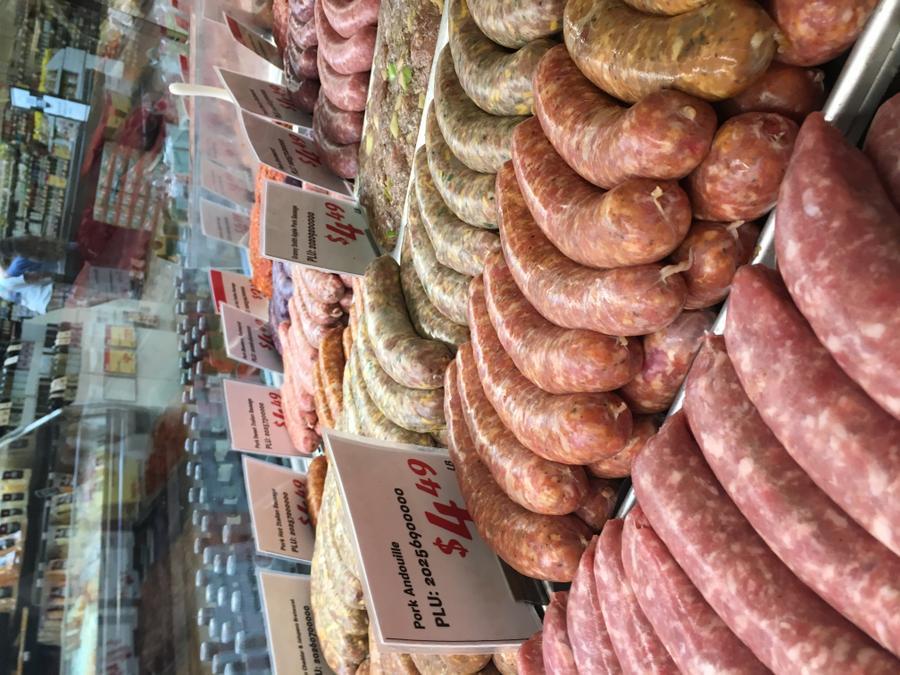
Being a vegetarian isn’t hard. Despite that being what most meat-eating people use as their be-all, end-all excuse, all anyone needs to become a vegetarian is a clear mindset, a little bit of willpower and an immediate and acceptable answer to the question, “But why?”
When people ask, I tell them I’m a selfish vegetarian, an answer that may be difficult to comprehend. I am selfish by keeping meat out of my diet simply because being powered by plants gives me a certain energy, an alertness that comes with digesting all the food you just ate in under an hour.
Feeling light and healthy because of your food feels right, and of course, so does the benefit of helping the environment, choosing not to participate in the cut-throat corporate meat industry and gaining some sort of bizarre elitist status after you have to “come out” to people you’re eating with about your radical lifestyle choices.
But, I have blood on my hands. Pig’s blood usually, if it’s the beginning of the week, and chickens’ or cows’ if it’s pretty much any day of the week. I am a vegetarian and an eager employee of Lucky’s Market’s meat department. I spend most workdays gutting fish, slicing bacon, grinding chicken and, the most troubling part, making bratwursts. I get to see how the literal sausage gets made.
A living and breathing hypocrite, as my vegan friend from back home described me. “How could you do it?” I asked myself the same question on the first day when I was asked to fish for pig intestines in a salty, yellow pail of liquid. Yes, parts of my job are ironic and gross, but I don’t feel bad or sick, anymore. I am fortunate to work at Lucky’s, where the farms we get our meat from are graze-only, hormone and antibiotics-free. I am unafraid of telling customers which farms our cattle are from or answering the “whether the animal was happy” question.
It’s comforting as a vegetarian to know people care, and I like to get my hands a little dirty because it makes me feel like I am earning the title of vegetarian since I know the dark side so well. I also get to be the buffer for moral meat and consumers who are curious about what they’re putting into their body.
However, I’ve noticed even the most conscious of shoppers are a bit sensitive. People’s relationship with food is fascinating because the process of getting and eating is so detached nowadays. Generally speaking, folks don’t like to think about slaughterhouses and the common poor-living conditions of farm animals because it makes them feel guilty; there’s a responsibility there. The meat and poultry industry is the largest segment of U.S. agriculture, according to the North American Meat Institute, and it’s nearly impossible to hunt and store your own food now, so many Americans rely on a system that generates a product, and no one asks questions. Mass production in the industry is key, and it often comes with cutting the corners of morality and respect for what we eat by keeping pigs in body cages and not allowing cows to sit or see the sun. Watch Netflix’s “Cowspiracy” to see what I’m talking about and ensure no sleep tonight, accompanied by a guilty next purchase of your favorite hot dogs.
I inquired to my colleagues about their experience on the relationship between people and their meat.
“Only sometimes do customers ask me to double package their meat so they don’t have to touch it. And they’re probably just vegetarians,” Korey Kilpatrick, a two-year employee of Lucky’s, said. (My co-workers relentlessly remind me of my rank as vegetarian in their department, don’t you worry.)
Other members of the department either shook their head or had trouble recalling a specific event of particular customer.
So maybe I’m sensitive to this issue because of my restricted diet. I just find it curious when I tell people who order both chicken and pork brats that I am required to separately package the animals, and they scrunch their noses and scoff “animals?” Even the word poultry is somewhat distracting. To be clear, your hamburger is a product of death and I find it increasingly important to remember that. Killing a cow gives you food and, in turn, life, but I think we’re missing a vital piece of the cycle if we forget that. Sure, consumers can feel better shopping for meat at a natural grocery store, but I hope that ease stems from a conscious mindset and an active form of empathy toward other beings. Many of us have a choice of which animal products we put into our bodies, so I celebrate the consumers who refuse ignorance and adjust their habits accordingly by shopping deliberately. I simply fear people don’t care or know what the death was or how it went. They get their packaged mush of bright pink ground beef and the contrived food chain continues.
I move three four-pound pig’s bellies in and out of a freezer all day and customers get uncomfortable when I remind them that their brats are different animals. There is a type of humanity I gain from interacting so personally with meat that stretches and strains my empathy towards both animals and the ones eating them. My ambition is to have people think, not to make them feel guilty or even necessarily change their ways. I understand the pressures of convenience; I just want to put skin in the game of being the top predator on this planet. It seems more human that way. So, if you ever find yourself a customer at Lucky’s roaming the meat department, call me over and I’ll give you all the information you need to know about tonight’s potential dinner- except of course, about how it will taste.